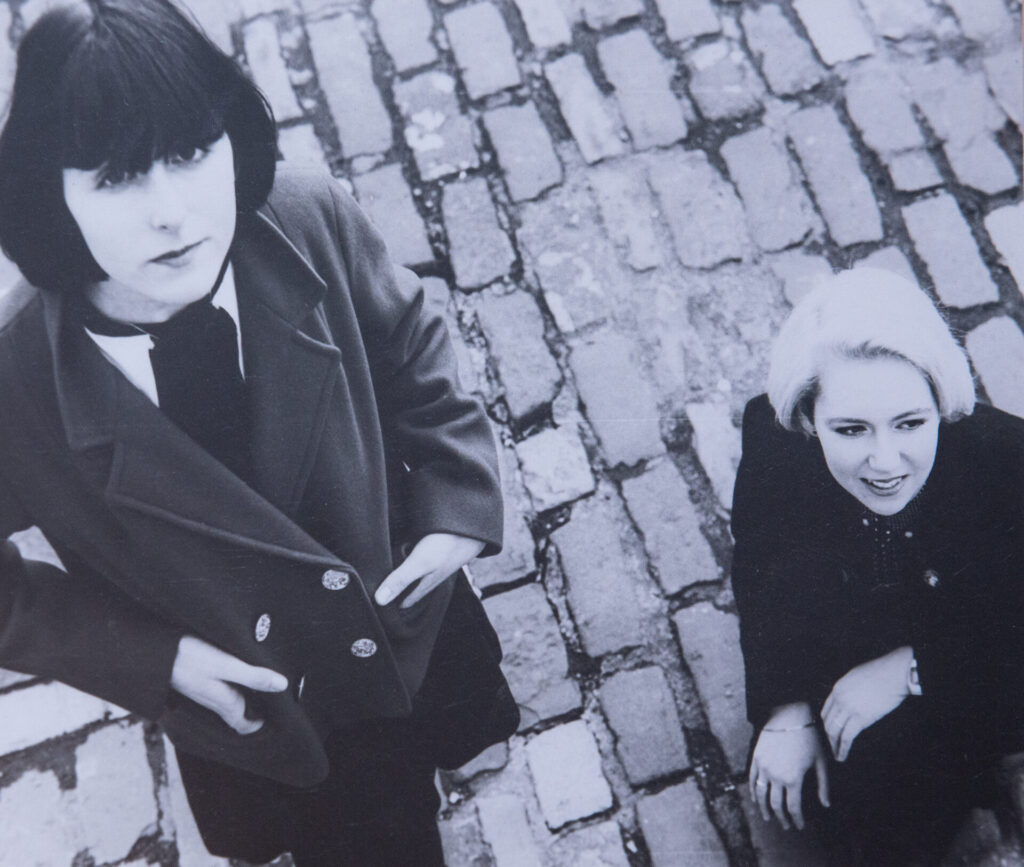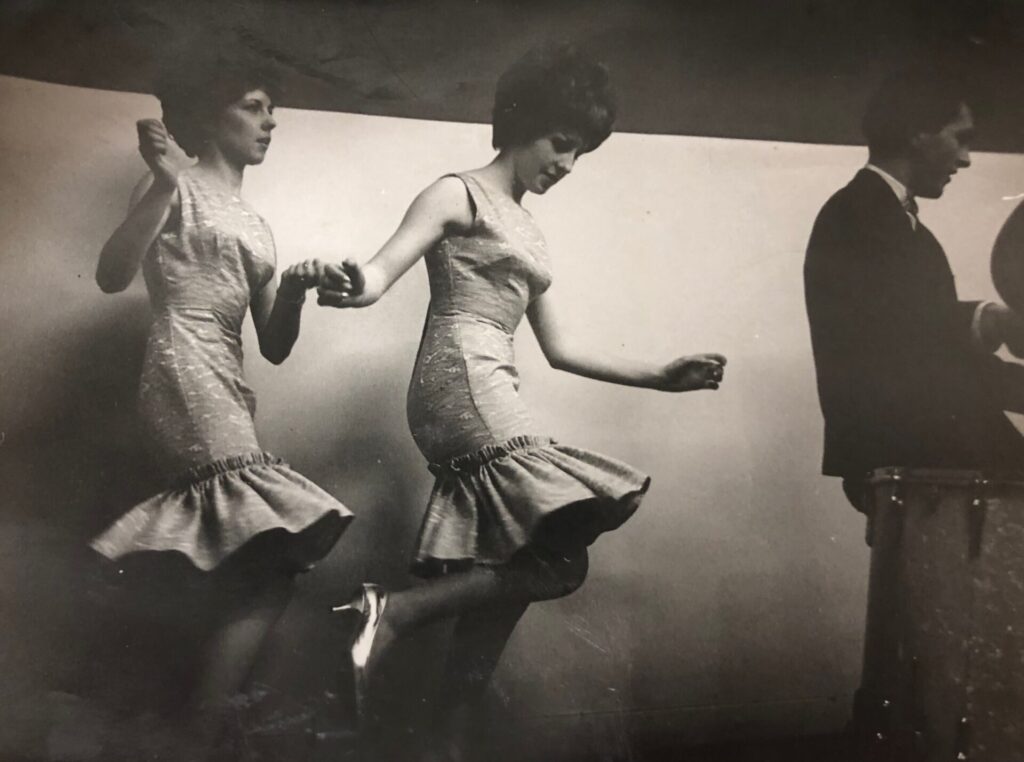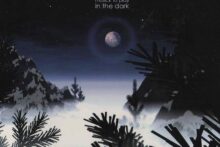“Watching the documentary, you were left at the end going, ‘But… why?’ Why didn’t these bands receive more recognition? I mean, that’s good music.”
Louise Rutkowski is saying exactly what everyone else will think after watching Since Yesterday: The Untold Story of Scotland’s Girl Bands. Louise and her sister Deirdre Rutkowski formed the 80s soul pop band Sunset Gun, one of the groups featured in the new documentary about to tour UK cinemas. A fascinating, fierce and impressive examination of talent that has been criminally overlooked, the film shows us Scotland’s glorious female punk, pop and rock bands from the 1960s until now; trailblazers, activists, musicians and artists who have almost vanished from history.
Written and narrated by Carla J. Easton (the indie pop solo artist, founding member of TeenCanteen and keyboardist for The Vaselines), it’s a labour of love, over eight years in the making, which finally gives voice to the incredible girl bands left out of the Scottish canon. As well as Sunset Gun it features The McKinleys, The Ettes, Strawberry Switchblade, The Hedrons, Sophisticated Boom Boom, His Latest Flame, The Twinsets, Lung Leg and Hello Skinny. Dressed head to toe in polka dots, finger snapping on black and white film, whacking cardboard box drum kits, jamming in manky basements, writing feminist lyrics – here were women navigating a male dominated industry, questioning the status quo and making genuinely brilliant music, all while having each other’s backs, turning actual sisterhood and tight friendship into a political gesture. But each group takes turns to tell their own story of being dropped, undersupported and ultimately brushed under the carpet.
“Why did I not grow up with posters of these bands on my bedroom walls?”, laments Easton in her documentary voiceover. She was obsessed instead with Jem And The Holograms, an imaginary American rock band from the 1980s cartoon Jem.
Jeanette Gallacher (née McKinlay) is the first talking head in Since Yesterday, reminiscing about the Edinburgh talent contest that she entered with her big sister, Sheila. After winning the contest, their gorgeously harmonic pop duo The McKinleys [sic] was snapped up by the Malcolm Nixon Agency and sent to London to record a demo. After a whirlwind year, with four singles released between 1964 and 1965, including the driving sass of the girl group classic that never was, ‘Sweet And Tender Romance’, their label went bankrupt and the sisters were left high and dry. In that short time they had toured with The Beatles and supported The Rolling Stones at Wembley (the first ever girl band to play there), and had been the first Scottish girl band to break the UK charts. Finding themselves suddenly without any contacts or industry know-how, they were bailed out by a German agent and relocated abroad so they could still earn an income.
The sisters later found out that Brian Epstein had personally offered to manage them, but had been fobbed off by their label, without the artists being consulted – it was just one example of how the Malcom Nixon Agency failed to nurture the duo, passing up endless opportunities to promote them properly.
“There was mismanagement,” shrugs Jeanette Gallacher philosophically, handing me coffee and a KitKat at her home in Dunbar. “Stupid is not the word for the label. It was shocking. They kept us so short of money it was pathetic. They were not nice people. But we were so naive. We felt so honoured to be asked to perform. Singing and performing was what we loved doing. My dad had signed the contract but he’d have signed anything, none of us had a clue.”
Gallacher concedes that male acts would have been getting ripped off at the time too, but there’s no denying how gender played a large part in their poor treatment. “I feel guys just had more gumption to speak up. I was a teenager. We were frightened. We’d knock on the office door to ask about money and they’d always say that nothing had come in yet. That was a lot of shit! The money was going straight to the agency, we weren’t seeing it. If I could give my younger self advice, it would be to stand my ground more, be more forward. I wish I’d had the guts to say, ‘This is it, or we are going elsewhere’.”
While the sisters were put up in ropey boarding houses and booked for contract cabaret gigs that Gallacher says, “really weren’t our thing”, she is grateful they had each other to lean on during that time in London.
“We’d never tell our parents any negative things, they’d have worried too much. We kept each other company. We’d be lying on a bed upstairs before going to play some awful gig and say to each other, ‘Shall we bother going down?’. Sometimes it was hilarious. We knew we were on a hiding to nothing,” she laughs. One of the documentary’s most moving scenes is when Gallacher gets choked up talking about her older sister, who died in 2012 of cancer. Although she will perform live in Glasgow’s Mono, as part of a special documentary screening and gig alongside 80s Glasgow girl band legends Sophisticated Boom Boom, Louise Rutkowski and Hen Hoose, it’s obviously bittersweet that the other half of The McKinleys can’t be there to harmonise with her.
“I might get choked up again now!”, she warns me. “I’d have really loved that. For her to see all this now. I loved her dearly. She was a gorgeous girl with a wonderful voice.
“Of course I’m angry at the agency, when I look back at how we were taken advantage of. No one has heard of us now. The Bangles somehow found our single ‘Sweet And Tender Romance’, and covered it, saying they’d found this obscure song by The McKinleys, which was very nice. But besides that, there’s almost nothing online now – not even any of the TV clips of Ready Steady Go! or Lucky Stars’ Summer Spin when we were on alongside Dusty Springfield and The Beatles, I’d love to see those.”

Similarly, Rutkowski could look back in anger at the way her band Sunset Gun was treated, but says that she deliberately tries not to dwell on it. “As an artist you can’t help but wonder, ‘What did we do wrong?’ But I also know, we had the voices. We didn’t have the major label behind us though.”
When Rutkowski was 19, after playing just one gig at The Venue in Glasgow, there was a bidding war to sign Sunset Gun. Victors CBS released three singles – including heavenly, rich harmonies and earwormy slap bass on the aptly named ‘Sister’, with lyrics about always being lifelong friends. The label was eager for the Rutkowski sisters, by then a three piece with multi-instrumentalist Ross Campbell, to record their 1985 debut album, In An Ideal World. When the soulful, hooky record failed to sell, however, they were dropped.
“Of course they could definitely have done more. Looking back they made no videos for us, there wasn’t a tour. We played gigs here and there but they didn’t push us as they could have.”
As a Covid pandemic project, Rutkowski transcribed her diaries from the mid 1970s to 1985, where she was reminded of how many rehearsals and recording sessions she and the band were doing, only for the album to fail to chart. “It’s there in black and white how hard we were working. So then why did so little happen? It’s extraordinary in a way; why do they go to the bother of spending all those thousands on a recording studio and then not promoting us? I now know when a label chooses to invest in someone, the wheels very quickly get into forward motion.”
Gallacher speaks about being very aware of the industry’s double standards for female artists – the rules about how they must dress and sound, the tendency to sexualise performers, or as she put it, “always be judged on your boobs”. I ask Rutkowksi what pressures were put on her and her sister in terms of their appearance.
“To be fair the record company never really mentioned it, and they seemed happy to go with our photos and artwork, but maybe that was something sitting in somebody’s marketing strategy notes. You never know what the thinking is. Ok, we might not have been the traditional ‘sexy chicks’ that major labels might want. But Dee and I were never, ever interested in that and wanted it to be about the music. My view is, if a female artist wants to go down that route, and be pushed into a certain category, away you go, as long as you’re happy about it and can cope with it all. Just please don’t make us all be like that!”
As for the sororal bond in particular, I ask Rutkowski how that helped the sisters creatively and professionally in Sunset Gun and later projects, including This Mortal Coil.
“Dee and I always joke that we share the same brain. We could exchange a look and know what the other one was thinking, even if that was something we’d discussed eight weeks ago. We were raised by our parents to stick together as siblings, even if that meant our brother and us ganging up against our parents. That was always the glue. Musically we were aiming for the same thing which was important. Making music is such a personal, intimate experience, you’re sharing your hopes and dreams. If you’re not getting on, that tension will come out behind the scenes. Maybe that’s part of the Oasis appeal: the music industry always loves something that makes headlines.”
One week after the world premiere of Since Yesterday, Oasis announced their 2025 UK tour. Cue a fan frenzy, a ticketing fiasco and folk paying more than £350 per head to see the band brothers reunited, throwing a stark contrast between these sisters’ experiences, and the industry’s enduring obsession with the acrimony between the Gallagher brothers. It begs the question – are we more interested in their narrative because they are brothers at war? Does the music industry reward controversy over quality? Is a dysfunctional sibling combo more appealing than a stable one?
“Being in the music industry, period, is not easy,” says Rutkowski. Major labels like an angle, something that gets people talking. There is a reason there are so many music documentaries made about bands having creative differences and falling out. That pressure, those schedules, it affects relationships if you’re not careful. Dee and I were always aiming for the same thing – that soulful sound. Putting us together in a recording studio felt almost like a womb-like space, we were happy working together.”
Maybe that harmony was not what was needed to shift records. Supportive sisters perhaps don’t quite capture the public’s attention in the same way as, say, Jim and William Reid of The Jesus And Mary Chain, who became notorious for their onstage altercations. If proof were needed of the validation given to certain toxic behaviours, it’s said that Creation Records boss Alan McGee signed the band in the 80s after witnessing a fight between the two brothers.
In the early days as a duo, The McKinleys were prone to the odd sisterly spat and Gallacher speaks in the documentary about the “brilliant arguments” that she had with Sheila, but they generally blew over quickly.
“As sisters, you don’t take any shit from each other!”, she laughs. “When we started out we’d regularly have these fracas. The engineers just got used to it. I would be quite nippy. We were quite equally matched, although sometimes Sheila would resort to violence. The boys used to be amazed, we’d be having a right go at each other, then next minute just be totally normal with each other. That’s what sisters do.”
Thankfully Rutkowski and Gallacher’s music was rediscovered by Carla Easton during her dogged unearthing of Scottish girl band buried treasure. Although Gallacher is nervous to perform again live, she’s intrigued to see what might come next.
“When the Edinburgh film screening sold out, I just thought, ‘Who’s even buying these tickets? No one knows who we are!’ It’s really all thanks to Carla.”
Rutkowski, meanwhile, firmly believes in continuing to make music, regardless of age. “All that stuff about being too old, it’s a nonsense and it’s much worse for women. If you’re enjoying it, I say get on with it! It’s so nice for us to hear how Sunset Gun is being appreciated by new audiences, that means a lot to us.”
There is a special screening and live gig at GFT and Mono, Glasgow tonight (18 October) featuring Sophisticated Boom Boom who will reform for one night only. Also on the bill will be Scottish female and non-binary songwriting collective Hen Hoose performing songs from the film joined on stage by Louise Rutkowski and Jeanette Gallacher.
For info on other cinema screenings, including select special events with Q&As, click here.



